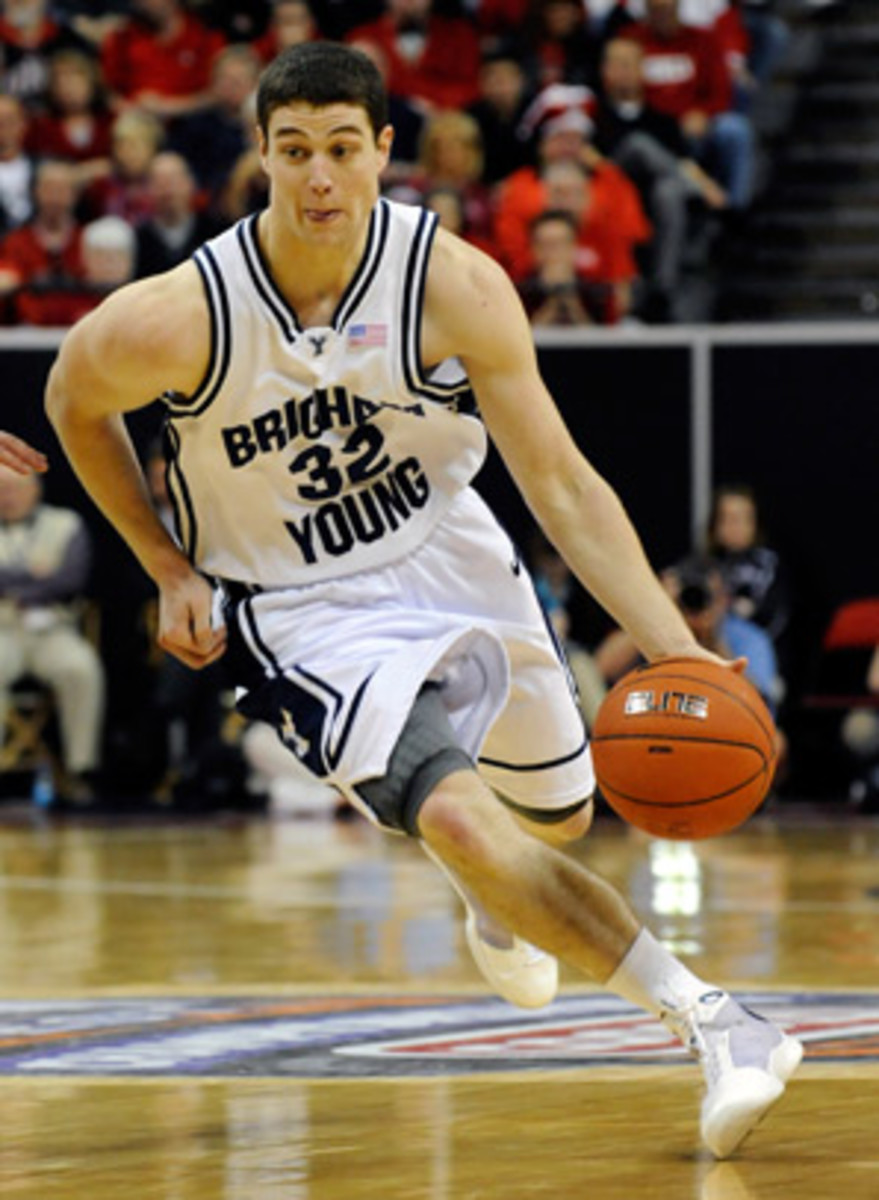With stakes higher than ever, can BYU deliver when it counts?
Since head coach Dave Rose took over in 2005, the Cougars have gone 127-40 overall and 64-16 in the Mountain West with three conference titles. On the flip side, BYU hasn't won the league's postseason tournament in that span (albeit having lost to annual host UNLV in the final in both 2007 and '08) and has gone just 1-4 in the NCAA tournament. The first three of those losses came as a No. 9 seed in games which historically are virtual coin flips.
It's obvious that a team's performance over 30-plus games is more representative than in a single-elimination affair. But given that BYU is coming off its first NCAA win since 1993 and is returning All-American point guard JimmerFredette, the stakes and pressure on Rose's program have been raised.
"We're very fortunate that we've gotten in position where that now has become quite a priority," Rose said. "What you want to do is put yourself in position to compete at the highest level in the postseason. I think last year's win against Florida was terrific for our players and their confidence."
In particular, Fredette's confidence should be at a considerable level after he poured in 37 points in that double-overtime win over the Gators and then spent much of the spring and summer testing himself on the NBA landscape. After going through numerous pre-draft workouts, Fredette also was part of the college team that helped prepare the U.S. national team for the FIBA World Championship, which starts Aug. 28 in Turkey.
Now, after a junior year in which he averaged 22.1 points and 4.7 assists per game, Fredette will enter the season as a legitimate Naismith Award candidate. And his ability to balance leading his team while developing his own game to improve his draft stock will be crucial to BYU's success. Fredette believes he can do that, as the crux of his NBA feedback beyond his need to improve his strength and conditioning involved showing that he's "willing to do anything in a team concept."
This season's concept in Provo is to use that Florida win as a fulcrum for bigger things, and the Cougars return a good deal of talent around Fredette to enable that approach. Senior backcourtmate Jackson Emery averaged 12.5 points a game while shooting 43.1 percent from three-point range, while 6-foot-8 junior forward Noah Hartsock, despite playing just 24 minutes a game, led the team in rebounding (5.8 per game). Things could have looked even better had standout guard TylerHaws, who started almost every game as a freshman last season, not been called for a two-year religious mission in the Philippines.
The comings and goings of players on missions adds another complicating dynamic into the annual team-building process, but Rose has proven to be a very adaptable leader. In his tenure, BYU has had success being led by post scorers, like Keena Young and Trent Plaisted, then by face-up forward Lee Cummard, and now by guards who favor dribble-penetration.
Last season's Cougars, who finished at No. 10 in KenPom.com's overall 2010 rankings, were third in three-point percentage (41.4 percent) among Division I schools and led the nation in free-throw percentage (79 percent). Statistically speaking, on both ends of the floor, they had almost every characteristic you would look for in a legitimate Final Four threat, but they went just 6-6 against teams in Pomeroy's top 75 and couldn't get past a strong Kansas State team with a spot in the Salt Lake City regional round looming as an enormous reward.
So, entering this season, the question remains: Why hasn't BYU lived up to statistical billing? In their own words, having gone 17 years between NCAA wins, it may have been a case of stage fright.
"We have such cerebral guys in some respects, I think the win against Florida last year will do us a world of good," said associate head coach Dave Rice. "I think there are some times where our guys wonder if we belong, as crazy as that sounds, from a national standpoint."
Fredette concurred, noting that if the Cougars make their fifth straight appearance in the NCAAs this season, they won't "have that glaze in our eyes" that came with a lack of confidence in big games against major-conference teams.
There will be spots before March in which BYU can test its newfound big-game comfort, especially in league play, where the top of the Mountain West is loaded again. San Diego State returns a lot of talent, and if things work out with New Mexico's transfers and Tre'von Willis' legal issues at UNLV, there's a strong chance the conference repeats its four-team congregation in the NCAAs.
Will this be the Cougars' last chance at a Mountain West crown? With the university pondering its athletics model, the future is, at this point, unclear.
Rose declined comment on the situation, but a shakeup would add an extra level of pressure to this basketball season. If the Cougars move to the depleted WAC or even elect to join the West Coast Conference, which doesn't have a peer institution anywhere near BYU's size, a deep postseason run this year could be critical to future recruiting.
Ultimately, BYU may end up positioned like a Gonzaga or Memphis, a prototypical big fish in a small hoops pond. As such, the ability to play a higher-profile nonconference schedule would be nice, but wins in March are the best currency. With good talent, experience and newfound confidence, the odds are that BYU should find success in that cauldron this season. For various reasons, it would be a good time for them to hold up.





